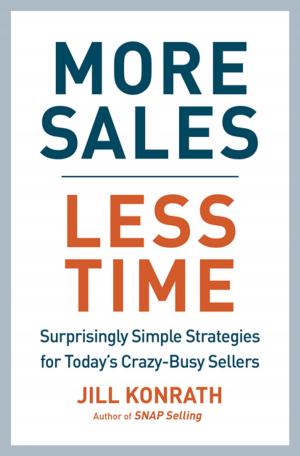The Loyalty Leap
Turning Customer Information into Customer Intimacy
Business & Finance, Marketing & Sales, Direct Marketing, Customer Service, Consumer Behaviour| Author: | Bryan Pearson | ISBN: | 9781101572283 |
| Publisher: | Penguin Publishing Group | Publication: | May 10, 2012 |
| Imprint: | Portfolio | Language: | English |
| Author: | Bryan Pearson |
| ISBN: | 9781101572283 |
| Publisher: | Penguin Publishing Group |
| Publication: | May 10, 2012 |
| Imprint: | Portfolio |
| Language: | English |
Collecting data is easy for marketers. Figuring out what to do with it is hard.
Technology has made it almost routine for companies to know exactly when, where, and how their customers shop, both online and off. As soon as someone pulls out a credit card—or even better, a membership rewards card—the data floodgates open. United Airlines knows if you think it’s worth $25 to check a suitcase. Verizon knows how often you call your mom. Hilton knows if you prefer a higher floor and a room away from the elevator.
But after gathering and crunching all this customer data most companies have little or no idea how to use it. They either let it go to waste or abuse it with ill-considered, irrelevant, or even creepy marketing pitches. There’s a much better option, as Bryan Pearson has discovered after twenty years of studying the hidden patterns of consumer behavior. It really is possible to turn customer information into customer intimacy— systematically, efficiently, and without invading anyone’s privacy. And intimacy is the key to long-term loyalty, growth, and profits. As Pearson writes:
Customers can only be acquired, churned, and reactivated so many times before they tire of your brand. There is a proven marketing equation in which customers willingly share information with you in the expectation of being better served and valued during future transactions. Capitalizing on that equation is our business responsibility.
The Loyalty Leap will give you the tools to persuade customers to share more information in their own best interests. And it will help you make sense of all that data to build strong customer relationships. It also shares compelling examples, including:
- How Shell increased sales while reducing its network of gas stations by giving its best customers incentives to buy from another location.
- How GameStop offers its PowerUp Rewards members access to such events as the Comic-Con convention.
- How McDonald’s in Finland used location-based marketing to send special offers to customers near one of its locations, with a 40 percent response rate.
- How Caesars Entertainment uses data from its 40 million Total Rewards members to draw complete customer profiles, resulting in increased visits.
Pearson believes this is one of the most exciting times in the history of marketing, and that loyalty marketing will be increasingly essential for years to come. His book will take you behind the curtain to show how the best companies are doing it.
Collecting data is easy for marketers. Figuring out what to do with it is hard.
Technology has made it almost routine for companies to know exactly when, where, and how their customers shop, both online and off. As soon as someone pulls out a credit card—or even better, a membership rewards card—the data floodgates open. United Airlines knows if you think it’s worth $25 to check a suitcase. Verizon knows how often you call your mom. Hilton knows if you prefer a higher floor and a room away from the elevator.
But after gathering and crunching all this customer data most companies have little or no idea how to use it. They either let it go to waste or abuse it with ill-considered, irrelevant, or even creepy marketing pitches. There’s a much better option, as Bryan Pearson has discovered after twenty years of studying the hidden patterns of consumer behavior. It really is possible to turn customer information into customer intimacy— systematically, efficiently, and without invading anyone’s privacy. And intimacy is the key to long-term loyalty, growth, and profits. As Pearson writes:
Customers can only be acquired, churned, and reactivated so many times before they tire of your brand. There is a proven marketing equation in which customers willingly share information with you in the expectation of being better served and valued during future transactions. Capitalizing on that equation is our business responsibility.
The Loyalty Leap will give you the tools to persuade customers to share more information in their own best interests. And it will help you make sense of all that data to build strong customer relationships. It also shares compelling examples, including:
- How Shell increased sales while reducing its network of gas stations by giving its best customers incentives to buy from another location.
- How GameStop offers its PowerUp Rewards members access to such events as the Comic-Con convention.
- How McDonald’s in Finland used location-based marketing to send special offers to customers near one of its locations, with a 40 percent response rate.
- How Caesars Entertainment uses data from its 40 million Total Rewards members to draw complete customer profiles, resulting in increased visits.
Pearson believes this is one of the most exciting times in the history of marketing, and that loyalty marketing will be increasingly essential for years to come. His book will take you behind the curtain to show how the best companies are doing it.















